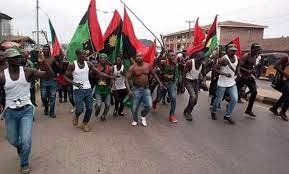How activities of ESN/IPOB ground economy of Southeastern Nigeria
In the past three years, the security situation in the South East has been very devastating.
Hundreds of people, including personnel of the army, police civil defence and civilians have been killed. Dozens of these innocent victims were summarily executed on the streets. Facilities belonging to the Independent National Electoral Commission (INEC) and security agencies, in addition to private properties, have also been attacked and destroyed.
The deterioration of the security situation in the region comes amid a growing campaign for Biafran independence strongly championed by the Indigenous People of Biafra (IPOB), led by Nnamdi Kanu.
READ ALSO: One killed as ESN/IPOB men attack Ebubeagu headquarters in Anambra
In the absence of any serious containment measures, criminals seized the zone by the jugular while others like the Eastern Security Network (ESN), a paramilitary organisation of the proscribed Indigenous People of Biafra (IPOB) spread their campaign of terror under the pretext of working for the release of their leader Nnamdi Kanu. In the process, the entire region was converted into a human abattoir.
Today, socio-economic activities in the Southeast are systematically being laid to waste. An ill-conceived series of disruptions to social life, work, and business under the guise of a ‘sit-at-home’ order is frequently imposed by IPOB and its brutal enforcers throughout the zone. Fear of rough vigilante enforcement of these orders has led to a devastating impact on the domestic economy.
A significant portion of the population in the region are artisans, Keke riders, vulcanisers, hairdressers, cart pushers, petty traders, bricklayers, women frying Akara, and all those who depend upon daily toil and sweat to feed their families are affected by the sit-at-home order.
Due to the protracted breakdown of law and order, businesses are relocating outside the region while the queue of unemployment is lengthening.
Hotels, other leisure spots shutting down in South East
Outside Lagos and Abuja, Owerri, the Imo State capital seemingly has the highest number of hotels per square kilometre in Nigeria. This is even as many more are springing up in the new Owerri axis of the metropolis.
However, the security situation in the state caused by the ESN and other criminals has crippled the hospitality business in the state, as proprietors of hotels; nightclubs, lounges and other entertainment centres now lack customers. Their line of clientele from within the state and fun seekers from neighbouring states and even as far as Abuja at the weekends has reduced drastically, leaving several of these places desolate.
Most residents and business owners close their shops as early as 6 pm for fear of falling victim to the overzealous ESN personnel who have taken over the major streets. Most of the hotel and hospitality businesses in the state capital also reduced their staff strength due to low patronage.
Massive economic losses due to insecurity in South East
According to Business Day reports, insecurity and sit-at-home protests in the South East have led to massive economic losses estimated at almost N4 trillion in two years.
A study conducted by SBM Intelligence for DevEast Foundation Ltd./Gte, a not-for-profit policy and business advocacy organisation, showed that the losses were traced to specific factors including the loss of between four and five working days per week; job losses due to cutbacks by business owners in response to the reduced working hours and other lost opportunities; loss of clients and customers who find alternatives because of the unstable business environment in the South-East; and increased cost of service delivery because of extra logistical costs.
The South East is home to many micro, small and medium-scale enterprises and indigenous manufacturing, fabrication and agro-allied industries.
According to the report, businesses lose every Monday of the week to the sit-at-home protest and an extra day when Nnamdi Kanu goes to court, which means the sit-at-home approach has led to the loss of about four to five working days per month.
The protests affect not only a whole day but tend to have a spillover effect on the other days of the week with residents of the region losing side jobs and secondary businesses as the reduced working hours and time makes it hard to keep a business or job.
In addition, customers outside the region are forced to find alternatives as the South East has trade relations with neighbouring towns.
“Apart from traders who used to travel to nearby markets to sell their wares, those who had their customers coming into the region said their customers have reduced and are finding alternatives even in other places like Lagos,” the report said.
The violence and protests in the region have also increased the cost of service delivery for businesses.
“Businesses trying to keep up with customers outside the region have to include logistics and bear the risk, but only big businesses can afford this. As a strategy for keeping their customers, some companies have to add delivery services.
“They organise logistic vehicles and transport the goods to their customers’ destinations. Interstate transporters break long trips of 11-12 hours into two and continue in the morning to avoid arriving in the South East after the curfew commences. Traders of perishable goods like vegetables, fruits and other farm products complained of increased spoilage due to the extended off-market days,” the report said.
It said as businesses find it difficult to meet up with sales volumes, “they are faced with no option other than to retrench some of their employees.”
“Of those who still have their jobs, a good number who work with SMEs say they have experienced reductions in salaries, compensation or bonuses. Another coping method reported by small businesses is that they have opted to pay their employees daily rather than monthly salaries,” the report added.
The significance of the southeast to national development cannot be ignored, and conflict here risks destabilising the area’s economy. Cities such as Onitsha, Aba and Nnewi have emerged as manufacturing and commercial hubs, with export links to other Central and West African countries. Manufacturing makes up 31 per cent and 30 per cent of businesses in Onitsha and Aba. The unfolding violence in the southeast poses a serious threat to economic development and social stability.
Almost 90 per cent of those who returned to Nigeria from abroad for the Christmas and New Year celebrations, could not travel to their villages in the southeast because of insecurity.
Most of them who came back from Europe and other countries had to spend the period in Lagos State.
In a video, a man apparently out of frustration said:
“Sincerely speaking, the insecurity in South East is seriously doing us a bad thing. Almost 90 per cent of Igbos who returned to Nigeria from abroad for Christmas could not travel to their villages because of insecurity. The foreign currencies they would have spent with their people are being spent in Lagos hotels. Their village people are even coming to Lagos to see them.
“All these are happening because the people of South East do not want to listen and the ultimate losers are the poor people in the villages. As a result of this ugly development, the economy of the South East is going down the drain. As it stands, everything in the South East is in shambles. The Christmas celebration in the South East is total rubbish because people are afraid to go home. It is the people that invited this calamity on themselves and blaming outsiders for their woes,” he lamented.
Follow the Neptune Prime channel on WhatsApp:
Do you have breaking news, interview request, opinion, suggestion, or want your event covered? Email us at neptuneprime2233@gmail.com





